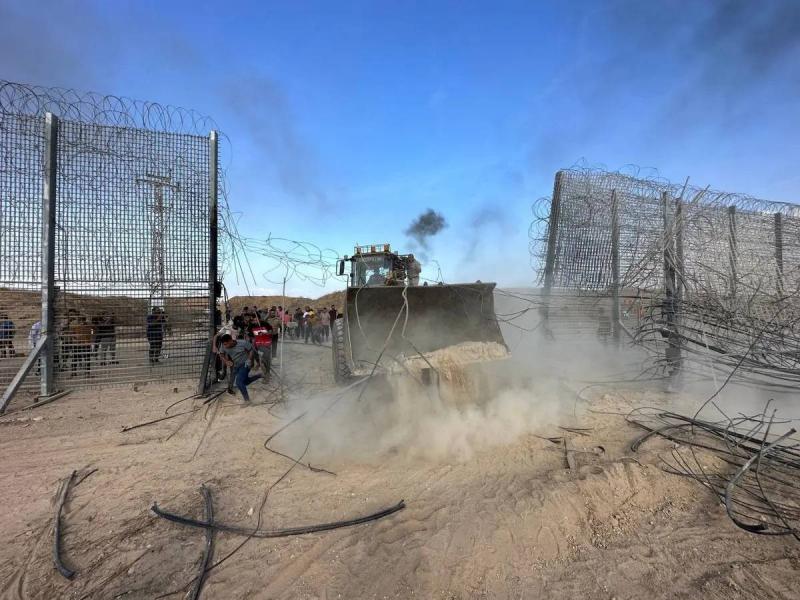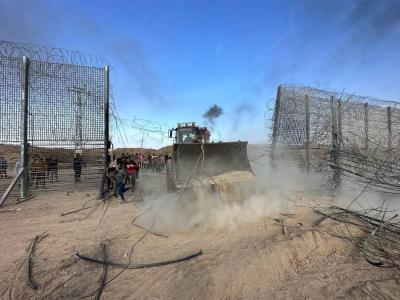The ceasefire, or any agreement to halt fire in Gaza, is no longer a goal in itself. Both parties involved, Israel and Hamas, are not in a hurry to achieve this objective. Hamas leaders in Gaza believe they have forced the Israelis into their own territory, indifferent to the scale of casualties and destruction. Yahya Sinwar's recently revealed messages see bloodshed as a beacon illuminating the path to liberation. In Israel, Netanyahu and his team are engaged in an existential battle where there is no place for Hamas or similar entities, neither in Palestine nor in its surroundings. The debate has shifted elsewhere, disregarding the power balances and humanitarian issues.
It is an open war driven by calculations ranging from the interests of its leaders to the desires of their affiliates beyond the bounds of Gaza and Palestine. Both warring parties are not lacking in friends, sources of advice, and funding. The Islamist Palestinian movement has support and refuge in Iran, Qatar, and Turkey, all of which have undisguised regional aspirations that have not reached the point of pressing for a framework for proposed settlements, the latest of which is the initiative from U.S. President Joe Biden, approved by the United Nations Security Council. Qatar merely expresses its discomfort, and Turkey, which considers Hamas to be, in the words of President Recep Tayyip Erdoğan, the "cream of the Palestinian national movement," continues to leverage the political investment from the crisis. Iran has not changed its view of the war and those involved in supporting it as fighters on the front lines defending the Iranian nation with its sectarian regime that needs a boost of support and legitimacy on the eve of appointing a new president and government.
On the eve of Eid al-Adha, Iranian Supreme Leader Ali Khamenei was keen to send a message to pilgrims in Mecca, aiming to capitalize on the occasion to suit his needs and perspective on the conflict. Khamenei stated, "Disavowal of the Zionist entity and its supporters, particularly the administration in the United States, must be evident both in words and actions among governments and peoples. Resistance for Palestine must be supported by all means, and supporting the people of Gaza has led the world to commend and venerate them for their immense patience and resilience."
While the pilgrimage administration was busy facilitating the affairs of millions of pilgrims arriving from all corners of the globe, Khamenei sought a means to provoke a transparent interest. Hamas did not delay in sending a similar message; its spokesperson, "Abu Ubaida," told the pilgrims that "the flood of Al-Aqsa" has commenced for the third holiest sanctum, and the rituals of Hajj are an opportunity to remind the two billion Muslims of the reality of our struggle against our enemy who violates the path of the Messenger of God and corrupts and Judaizes it every day." "Abu Ubaida" stated what Khamenei did not, transforming the October 7 attack into merely a religious assault unrelated to the Palestinian people, their land, or their captives.
Israel also has friends who stood with it since the October 7 attack. These include the United States, which has provided tremendous support in its ongoing war. They condemn Hamas, but their view of the conflict includes other ideas, including the necessity of reaching a political solution that allows for the establishment of an independent Palestinian state. Biden's initiative falls into this context, and the Arab world, which is primarily concerned with the Palestinian issue, has never ceased to call for a Palestinian state in exchange for comprehensive peace in the region. Hamas's policies, and those behind it such as Iran and its axis, contradict this direction, but they are not the only ones opposing it; the Israeli ruling team adopts a similar viewpoint, opposing both a cessation of the war and a Palestinian state.
Nonetheless, the Israeli political milieu is notably vibrant in analysis and criticism and in shifting responsibility, which is lacking in the Palestinian and Arab street. The continuation of war in Gaza is no longer convincing to many in Israel. "Maariv" described what is happening there as "trench warfare during World War I," asking, "Why doesn't the people stop the insanity of this gang and send them home?" The gang in question includes "three failed figures: Netanyahu, Gallant (the defense minister), and Herzi Halevi (the chief of staff)," according to Yitzhak Brik, who claims they are "willing to do anything to maintain power." Hitler did the same in Germany; when defeated, he ordered its destruction.
An Israeli opposition is growing day by day against the ruling team, calling for early elections and governmental change while insisting on stopping the war and returning the hostages, considering Netanyahu is leading Israel to destruction. This opposition is aware of the need to avoid conflict with the U.S. administration, with some warning of the subsequent harm to Israel's image in the region and the world, while others are merely engaging in a game of chairs, wanting to replace the ruler. However, at its core, the internal Israeli debate serves Netanyahu; he continues to advocate for the war to eliminate the threat in Gaza, the West Bank, and the north, where his army and Hezbollah exchange fire daily. His opponents argue for ceasing the Gaza battle in preparation for the inevitable upcoming regional war, which implies the possibility of engagement with all Iranian arms and perhaps even Iran itself.
The regional war appears to be the title in Israeli and Iranian discourse, and the trajectory toward it has not stopped since October 7. However, its cessation will require various pressures from mediators and allies of both parties, probably culminating in changes in Israel as well as in the fragmented Palestinian entity. The pressing question now is whether these changes will occur before this regional war or afterward? And can the mediators, at some point, achieve even a slight breach in the grand impasse constructed by both parties?




